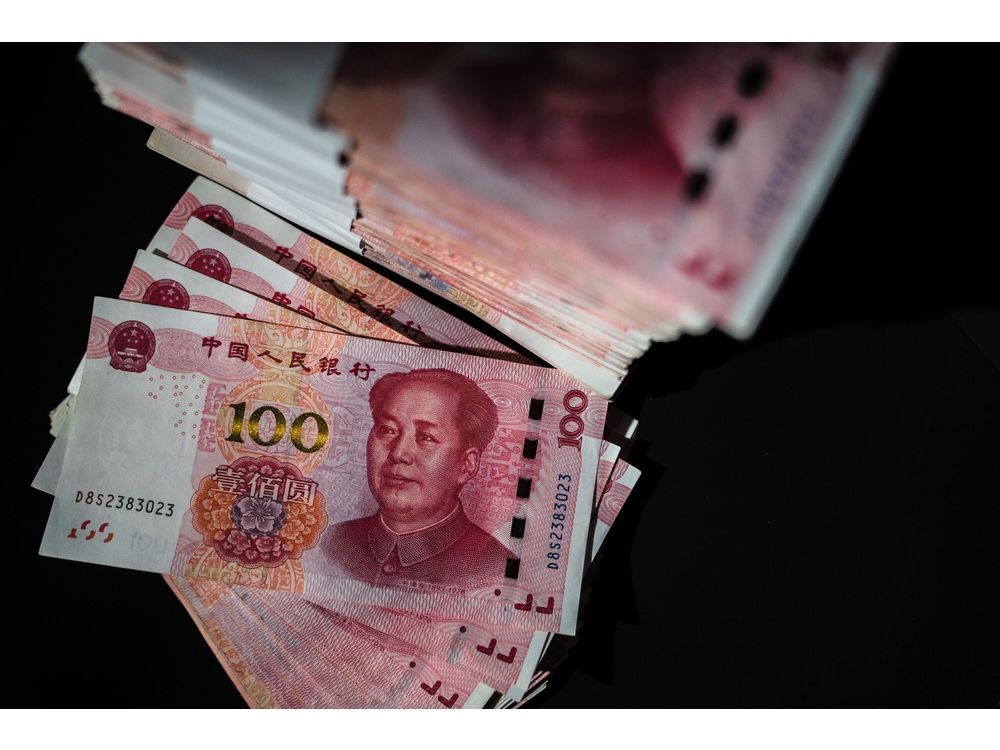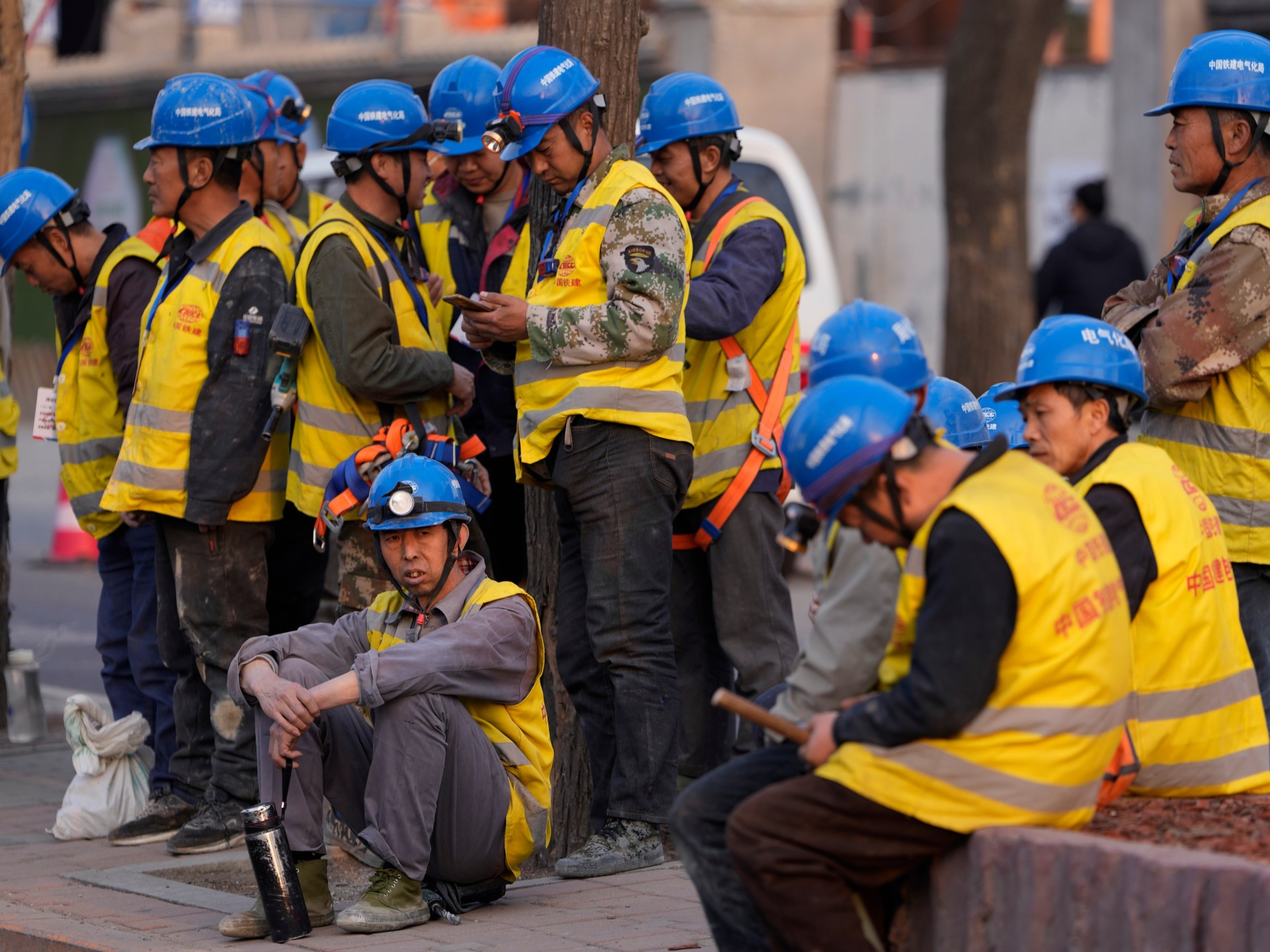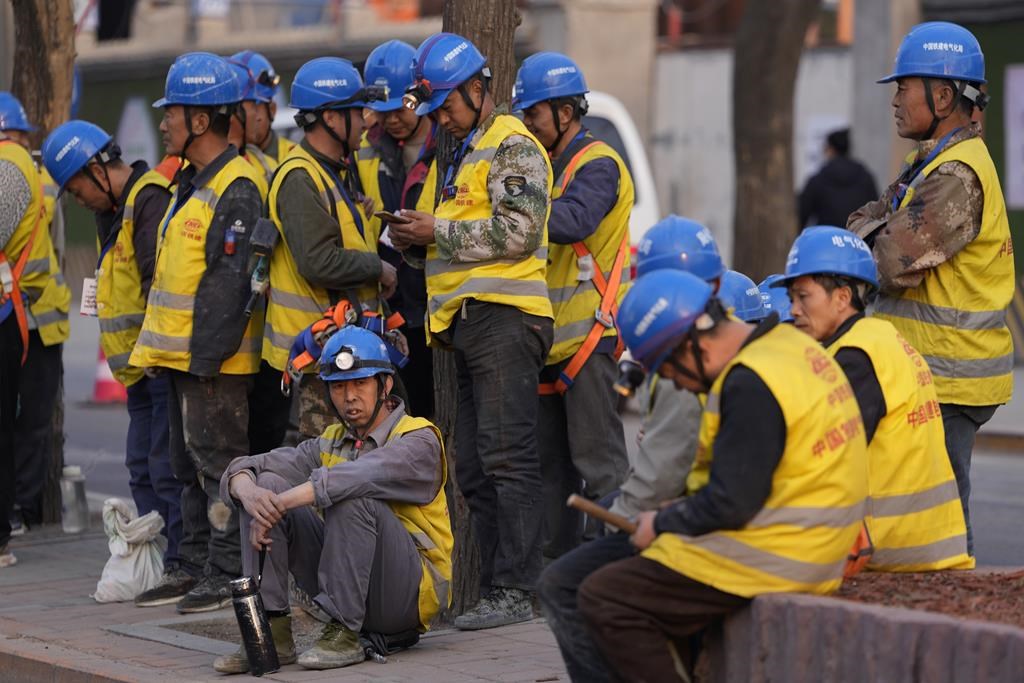Economy
US and Allies Condemn Economic Coercion With Attention on China
|
|


(Bloomberg) — The US and five major allies condemned economic coercion and non-market policies regarding trade and investment in a joint declaration that didn’t cite China by name but clearly had Beijing in mind.
The six countries expressed concern about practices that they say “undermine the functioning of and confidence in the rules-based multilateral trading system.”
The message from the US, Australia, Canada, Japan, New Zealand and the UK carries no economic consequences and mirrors one released by Group of Seven nations after a meeting of leaders last month.
A US Trade Representative official, speaking to reporters on condition of anonymity before the statement’s release, said China has been the biggest perpetrator of the behavior condemned in the declaration.
The official mentioned China’s decision to cut off trade with Lithuania in 2021 after that Baltic nation allowed Taiwan to establish a diplomatic office there as an example of the kind of economic coercion that the declaration singles out.
Read More: G-7 Eyes China With New Joint Effort Against Economic Coercion
In response to a reporter’s question, the official rejected any comparison to the US, which has become one of the most prolific purveyors of measures that could be seen as economic coercion, chiefly through financial sanctions and limits on technology exports to countries including China.
US sanctions occurred in accordance with US laws and procedures, and in light of relevant rules and norms, the official said. The declaration makes explicit that it didn’t apply to actions that have “a legitimate public policy objective.”
“These legitimate public policy measures include: health and safety regulations, environmental regulations, trade remedies, national security measures and sanctions, and measures to protect the integrity and stability of financial systems and financial institutions from abuse,” according to the declaration.





Economy
Stumbling Toward a Deal — as the Economy Surges – AGF Perspectives


Insights and Market Perspectives
CONGRESS IS STUMBLING TOWARD PASSAGE of legislation late this week that would provide enormous aid to Ukraine, Israel and Taiwan. It’s a VERY messy process — typically — that has obscured the major development for financial markets: red hot economic growth, far exceeding expectations.
WE’LL GET TO THE CONGRESSIONAL BRAWL in a second, but first — dramatic economic growth is having a major impact on interest rates, with the Atlanta Fed GDP Now predicting economic growth at 2.8%, after yesterday’s blowout retail sales report.
EVEN CHINA, considered a basket case a few months ago, is blasting off — with Beijing reporting 5.3% first quarter economic growth.
WITH THE U.S. TEN YEAR BOND YIELD now above 4.5%, this has to be a shock for the Federal Reserve, which may be frozen for months to come — unable to cut rates as long as the economy is growing above trend with inflation not falling to the Fed’s 2% goal.
THERE SURELY WON’T BE ANY FISCAL RESTRAINT, as Congress moves awkwardly toward passage of a nearly $100 billion spending package for allies.
THIS IS A VERY FLUID fluid environment — even a Tik-Tok ban is included — with House Speaker Mike Johnson preparing four separate bills in a dizzying process that may require support from Democrats — which could cost Johnson his job.
BOTTOM LINE: This is sausage-making at its ultimate, as Democrats prepare to bail out Johnson, as angry right wingers demand provisions to protect the border, and as aid seems increasingly likely — surely for Israel, probably for Ukraine. It’s only Tuesday, there’s a long way to go; details won’t come into focus for a few more days.
IN THE MEANTIME, THE ECONOMY CONTINUES TO ROAR — it’s too strong, in our opinion, to be sustainable.
THESE DRAMATIC STORIES MAY HAVE TO TAKE A BACK SEAT as the gleeful media is obsessed with the Donald Trump trial. The buzz after the first day was whether Trump dozed off yesterday during the jury selection process, Our advice to Trump — get some espresso, the last thing you want is opponents calling you “sleepy Don.”
The views expressed in this blog are those of the author and do not necessarily represent the opinions of AGF, its subsidiaries or any of its affiliated companies, funds or investment strategies.
The views expressed in this blog are provided as a general source of information based on information available as of the date of publication and should not be considered as personal investment advice or an offer or solicitation to buy and/or sell securities. Speculation or stated believes about future events, such as market or economic conditions, company or security performance, or other projections represent the beliefs of the author and do not necessarily represent the view of AGF, its subsidiaries or any of its affiliated companies, funds or investment strategies. Every effort has been made to ensure accuracy in these commentaries at the time of publication; however, accuracy cannot be guaranteed. Market conditions may change and AGF accepts no responsibility for individual investment decisions arising from the use of or reliance on the information contained herein. Any financial projections are based on the opinions of the author and should not be considered as a forecast. The forward looking statements and opinions may be affected by changing economic circumstances and are subject to a number of uncertainties that may cause actual results to differ materially from those contemplated in the forward looking statements. The information contained in this commentary is designed to provide you with general information related to the political and economic environment in the United States. It is not intended to be comprehensive investment advice applicable to the circumstances of the individual.
AGF Investments is a group of wholly owned subsidiaries of AGF Management Limited, a Canadian reporting issuer. The subsidiaries included in AGF Investments are AGF Investments Inc. (AGFI), AGF Investments America Inc. (AGFA), AGF Investments LLC (AGFUS) and AGF International Advisors Company Limited (AGFIA). AGFA and AGFUS are registered advisors in the U.S. AGFI is a registered as a portfolio manager across Canadian securities commissions. AGFIA is regulated by the Central Bank of Ireland and registered with the Australian Securities & Investments Commission. The subsidiaries that form AGF Investments manage a variety of mandates comprised of equity, fixed income and balanced assets.
About AGF Management Limited
Founded in 1957, AGF Management Limited (AGF) is an independent and globally diverse asset management firm. AGF brings a disciplined approach to delivering excellence in investment management through its fundamental, quantitative, alternative and high-net-worth businesses focused on providing an exceptional client experience. AGF’s suite of investment solutions extends globally to a wide range of clients, from financial advisors and individual investors to institutional investors including pension plans, corporate plans, sovereign wealth funds and endowments and foundations.
For further information, please visit AGF.com.
©2024 AGF Management Limited. All rights reserved.
Economy
China’s economy beats expectations, growing 5.3 percent in first quarter – Al Jazeera English


Statistics agency says economy has made ‘good start’ to the year under the leadership of Chinese President Xi Jinping.
China’s economy grew faster than expected in the first three months of the year, a boost for policymakers grappling with a property-sector crisis, weak consumer demand and mounting government debt.
Gross domestic product (GDP) grew by 5.3 percent in the first quarter, data released by the National Bureau of Statistics (NBS) showed on Tuesday, comfortably above forecasts and up from a 5.2 percent expansion in the previous quarter.
By sector, industrial production and agriculture grew by 6.1 percent and 3.8 percent, respectively, while services grew by 5 percent, according to NBS data.
The NBS said in a statement that the economy had made a “good start” under “the strong leadership” of the Central Committee of the Communist Party of China and President Xi Jinping.
“As a result, the policies continued to take effect, production and demands maintained stable and witnessed an increase, employment and prices were generally stable, market confidence continued to boost, and high-quality development made new progress,” the statistics agency said.
The stronger-than-expected figures came days after China reported that exports and imports declined 7.5 percent and 1.9 percent, respectively, in March, missing expectations.
The world’s second-largest economy has struggled to sustain a recovery from the COVID-19 pandemic amid a range of longstanding structural challenges, including a hugely indebted real estate sector and a shrinking population.
Fitch Ratings earlier this month downgraded China’s sovereign credit outlook to negative, citing “increasing risks to China’s public finance outlook” as Beijing attempts to move away from real estate-led growth.
Beijing last month set a 5 percent growth target for 2024, a rate that would beat most developed economies but be among the country’s slowest expansions since 1990.
Officials have unveiled a number of fiscal and monetary policy measures to boost the economy, including $1.8 trillion in spending on major construction and infrastructure projects.
Economy
China’s economy grew 5.3% in first quarter, beating expectations – CityNews Halifax


HONG KONG (AP) — China’s economy expanded at a faster than expected pace in the first three months of the year, helped by policies aimed at stimulating growth and stronger demand, the government said Tuesday.
The world’s second-largest economy expanded at a 5.3% annual pace in January-March, beating analysts’ forecasts of about 4.8%, official data show. Compared to the previous quarter, the economy grew 1.6%.
China’s economy has struggled to bounce back from the COVID-19 pandemic, with a slowdown in demand and a property crisis weighing on its growth.
The better-than-expected data Tuesday came days after China reported its exports sank 7.5% in March compared to the year before, while imports also weakened. Inflation cooled, reflecting deflationary pressures resulting from slack demand amid a crisis in the property sector.
Industrial output for the first quarter was up 6.1% compared to the same time last year, and retail sales grew at an annual pace of 4.7%. Fixed investment, in factories and equipment, grew 4.5% compared to the same period a year earlier.
The strong growth in January-March was supported by “broad manufacturing outperformance,” festivities-boosted household spending due to the Lunar New Year holidays and policies that helped boost investments, according to China economist Louise Loo of Oxford Economics.
“However, ‘standalone’ March activity indicators suggest weakness coming through post-Lunar New Year,” she said. “External demand conditions also remain unpredictable, as seen in March’s sharp export underperformance.”
Loo noted that an unwinding of excess inventory, normalization of household spending after the holidays and a cautious approach to government spending and other stimulus will affect growth in this quarter.
Policymakers have unveiled a raft of fiscal and monetary policy measures as Beijing seeks to boost the economy. China has set an ambitious gross domestic product (GDP) growth target of about 5% for 2024.
Such strong growth usually would push share prices across the region higher. But on Tuesday, Asian shares fell sharply after stocks retreated on Wall Street.
The Shanghai Composite index lost 1.4% and the Hang Seng in Hong Kong lost 1.9%. The benchmark for the smaller market in Shenzhen, in southern China, lost 2.8%.
Stronger growth in the region’s biggest economy normally would be seen as a positive for its neighbors, which increasingly rely on demand from China to power their own economies. However, strong growth figures are also viewed as a signal that the government will hold back on further stimulus.
Zen Soo, The Associated Press
-
Media20 hours ago
DJT Stock Plunges After Trump Media Files to Issue Shares
-
Business19 hours ago
FFAW, ASP Pleased With Resumption of Crab Fishery – VOCM
-
Media19 hours ago
Marjorie Taylor Greene won’t say what happened to her Trump Media stock
-
Business20 hours ago
Javier Blas 10 Things Oil Traders Need to Know About Iran's Attack on Israel – OilPrice.com
-



 Politics20 hours ago
Politics20 hours agoIn cutting out politics, A24 movie 'Civil War' fails viewers – Los Angeles Times
-
Art22 hours ago
It’s Time to Remove Father Rupnik’s Art – National Catholic Register
-
Media18 hours ago
Trump Media stock slides again to bring it nearly 60% below its peak as euphoria fades – National Post
-
Investment21 hours ago
A Once-in-a-Generation Investment Opportunity: 1 Top Artificial Intelligence (AI) Stock to Buy Hand Over Fist in April … – Yahoo Finance



